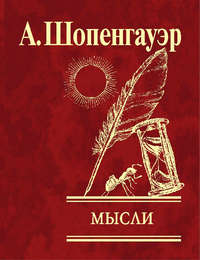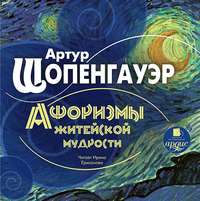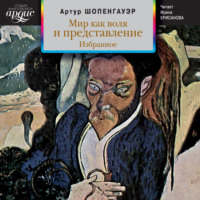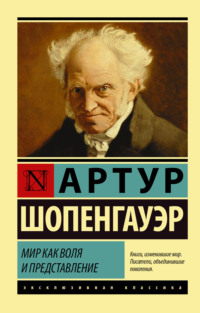 полная версия
полная версияThe World as Will and Idea (Vol. 2 of 3)
About all this, however, I find and assert that the whole antinomy is a mere delusion, a sham fight. Only the assertions of the antitheses really rest upon the forms of our faculty of knowledge, i. e., if we express it objectively, on the necessary, a priori certain, most universal laws of nature. Their proofs alone are therefore drawn from objective grounds. On the other hand, the assertions and proofs of the theses have no other than a subjective ground, rest solely on the weakness of the reasoning individual; for his imagination becomes tired with an endless regression, and therefore he puts an end to it by arbitrary assumptions, which he tries to smooth over as well as he can; and his judgment, moreover, is in this case paralysed by early and deeply imprinted prejudices. On this account the proof of the thesis in all the four conflicts is throughout a mere sophism, while that of the antithesis is a necessary inference of the reason from the laws of the world as idea known to us a priori. It is, moreover, only with great pains and skill that Kant is able to sustain the thesis, and make it appear to attack its opponent, which is endowed with native power. Now in this regard his first and constant artifice is, that he does not render prominent the nervus argumentationis, and thus present it in as isolated, naked, and distinct a manner as he possibly can; but rather introduces the same argument on both sides, concealed under and mixed up with a mass of superfluous and prolix sentences.
The theses and antitheses which here appear in such conflict remind one of the δικαιος and αδικος λογος which Socrates, in the “Clouds” of Aristophanes, brings forward as contending. Yet this resemblance extends only to the form and not to the content, though this would gladly be asserted by those who ascribe to these most speculative of all questions of theoretical philosophy an influence upon morality, and therefore seriously regard the thesis as the δικαιος, and the antithesis as the αδικος λογος. I shall not, however, accommodate myself here with reference to such small, narrow, and perverse minds; and, giving honour not to them, but to the truth, I shall show that the proofs which Kant adduced of the individual theses are sophisms, while those of the antitheses are quite fairly and correctly drawn from objective grounds. I assume that in this examination the reader has always before him the Kantian antinomy itself.
If the proof of the thesis in the first conflict is to be held as valid, then it proves too much, for it would be just as applicable to time itself as to change in time, and would therefore prove that time itself must have had a beginning, which is absurd. Besides, the sophism consists in this, that instead of the beginninglessness of the series of states, which was at first the question, suddenly the endlessness (infinity) of the series is substituted; and now it is proved that this is logically contradicted by completeness, and yet every present is the end of the past, which no one doubted. The end of a beginningless series can, however, always be thought, without prejudice to the fact that it has no beginning; just as, conversely, the beginning of an endless series can also be thought. But against the real, true argument of the antithesis, that the changes of the world necessarily presuppose an infinite series of changes backwards, absolutely nothing is advanced. We can think the possibility that the causal chain will some day end in an absolute standstill, but we can by no means think the possibility of an absolute beginning.8
With reference to the spatial limits of the world, it is proved that, if it is to be regarded as a given whole, it must necessarily have limits. The reasoning is correct, only it was just the first link of it that was to be proved, and that remains unproved. Totality presupposes limits, and limits presuppose totality; but here both together are arbitrarily presupposed. For this second point, however, the antithesis affords no such satisfactory proof as for the first, because the law of causality provides us with necessary determinations only with reference to time, not to space, and affords us a priori the certainty that no occupied time can ever be bounded by a previous empty time, and that no change can be the first change, but not that an occupied space can have no empty space beside it. So far no a priori decision on the latter point would be possible; yet the difficulty of conceiving the world in space as limited lies in the fact that space itself is necessarily infinite, and therefore a limited finite world in space, however large it may be, becomes an infinitely small magnitude; and in this incongruity the imagination finds an insuperable stumbling-block, because there remains for it only the choice of thinking the world either as infinitely large or infinitely small. This was already seen by the ancient philosophers: Μητροδωρος, ὁ καθηγητης Επικουρου, φηδιν ατοπον ειναι εν μεγαλῳ πεδιῳ ἑνα σταχυν γεννηθηναι, και ἑνα κοσμον εν τῳ απειρῳ (Metrodorus, caput scholæ Epicuri, absurdum ait, in magno campo spicam unam produci, et unum in infinito mundum) Stob. Ecl., i. c. 23. Therefore many of them taught (as immediately follows), απειρους κοσμους εν τῳ απειρῳ (infinitos mundos in infinito). This is also the sense of the Kantian argument for the antithesis, only he has disfigured it by a scholastic and ambiguous expression. The same argument might be used against the limitation of the world in time, only we have a far better one under the guidance of causality. In the case of the assumption of a world limited in space, there arises further the unanswerable question, What advantage has the filled part of space enjoyed over the infinite space that has remained empty? In the fifth dialogue of his book, “Del Infinito, Universo e Mondi,” Giordano Bruno gives a full account of the arguments for and against the finiteness of the world, which is very well worth reading. For the rest, Kant himself asserts seriously, and upon objective grounds, the infinity of the world in space in his “Natural History of the Theory of the Heavens,” part ii. ch. 7. Aristotle also acknowledges the same, “Phys.,” iii. ch. 4, a chapter which, together with the following one, is very well worth reading with reference to this antinomy.
In the second conflict the thesis is at once guilty of a very palpable petitio principii, for it commences, “Every compound substance consists of simple parts.” From the compoundness here arbitrarily assumed, no doubt it afterwards very easily proves the simple parts. But the proposition, “All matter is compound,” which is just the point, remains unproved, because it is simply a groundless assumption. The opposite of simple is not compound, but extended, that which has parts and is divisible. Here, however, it is really tacitly assumed that the parts existed before the whole, and were brought together, whence the whole has arisen; for this is the meaning of the word “compound.” Yet this can just as little be asserted as the opposite. Divisibility means merely the possibility of separating the whole into parts, and not that the whole is compounded out of parts and thus came into being. Divisibility merely asserts the parts a parte post; compoundness asserts them a parte ante. For there is essentially no temporal relation between the parts and the whole; they rather condition each other reciprocally, and thus always exist at the same time, for only so far as both are there is there anything extended in space. Therefore what Kant says in the observations on the thesis, “Space ought not to be called a compositum, but a totum,” &c., holds good absolutely of matter also, which is simply space become perceptible. On the other hand, the infinite divisibility of matter, which the antithesis asserts, follows a priori and incontrovertibly from that of space, which it fills. This proposition has absolutely nothing against it; and therefore Kant also (p. 513; V. 541), when he speaks seriously and in his own person, no longer as the mouthpiece of the αδικος λογος, presents it as objective truth; and also in the “Metaphysical First Principles of Natural Science” (p. 108, first edition), the proposition, “Matter is infinitely divisible,” is placed at the beginning of the proof of the first proposition of mechanics as established truth, having appeared and been proved as the fourth proposition in the Dynamics. But here Kant spoils the proof of the antithesis by the greatest obscurity of style and useless accumulation of words, with the cunning intention that the evidence of the antithesis shall not throw the sophisms of the thesis too much into the shade. Atoms are no necessary thought of the reason, but merely an hypothesis for the explanation of the difference of the specific gravity of bodies. But Kant himself has shown, in the dynamics of his “Metaphysical First Principles of Natural Science,” that this can be otherwise, and indeed better and more simply explained than by atomism. In this, however, he was anticipated by Priestley, “On Matter and Spirit,” sect. i. Indeed, even in Aristotle, “Phys.” iv. 9, the fundamental thought of this is to be found.
The argument for the third thesis is a very fine sophism, and is really Kant's pretended principle of pure reason itself entirely unadulterated and unchanged. It tries to prove the finiteness of the series of causes by saying that, in order to be sufficient, a cause must contain the complete sum of the conditions from which the succeeding state, the effect, proceeds. For the completeness of the determinations present together in the state which is the cause, the argument now substitutes the completeness of the series of causes by which that state itself was brought to actuality; and because completeness presupposes the condition of being rounded off or closed in, and this again presupposes finiteness, the argument infers from this a first cause, closing the series and therefore unconditioned. But the juggling is obvious. In order to conceive the state A. as the sufficient cause of the state B., I assume that it contains the sum of the necessary determinations from the co-existence of which the estate B. inevitably follows. Now by this my demand upon it as a sufficient cause is entirely satisfied, and has no direct connection with the question how the state A. itself came to be; this rather belongs to an entirely different consideration, in which I regard the said state A. no more as cause, but as itself an effect; in which case another state again must be related to it, just as it was related to B. The assumption of the finiteness of the series of causes and effects, and accordingly of a first beginning, appears nowhere in this as necessary, any more than the presentness of the present moment requires us to assume a beginning of time itself. It only comes to be added on account of the laziness of the speculating individual. That this assumption lies in the acceptance of a cause as a sufficient reason is thus unfairly arrived at and false, as I have shown at length above when considering the Kantian principle of pure reason which coincides with this thesis. In illustration of the assertion of this false thesis, Kant is bold enough in his observations upon it to give as an example of an unconditioned beginning his rising from his chair; as if it were not just as impossible for him to rise without a motive as for a ball to roll without a cause. I certainly do not need to prove the baselessness of the appeal which, induced by a sense of weakness, he makes to the philosophers of antiquity, by quoting from Ocellus Lucanus, the Eleatics, &c., not to speak of the Hindus. Against the proof of this antithesis, as in the case of the previous ones, there is nothing to advance.
The fourth conflict is, as I have already remarked, really tautological with the third; and the proof of the thesis is also essentially the same as that of the preceding one. His assertion that every conditioned presupposes a complete series of conditions, and therefore a series which ends with an unconditioned, is a petitio principii, which must simply be denied. Everything conditioned presupposes nothing but its condition; that this is again conditioned raises a new consideration which is not directly contained in the first.
A certain appearance of probability cannot be denied to the antinomy; yet it is remarkable that no part of the Kantian philosophy has met so little contradiction, indeed has found so much acceptance, as this exceedingly paradoxical doctrine. Almost all philosophical parties and text-books have regarded it as valid, and have also repeatedly reconstructed it; while nearly all Kant's other doctrines have been contested, and indeed there have never been wanting some perverse minds which rejected even the transcendental æsthetic. The undivided assent which the antinomy, on the other hand, has met with may ultimately arise from the fact that certain persons regard with inward satisfaction the point at which the understanding is so thoroughly brought to a standstill, having hit upon something which at once is and is not, so that they actually have before them here the sixth trick of Philadelphia in Lichtenberg's broadsheet.
If we examine the real meaning of Kant's Critical Solution of the cosmological problem which now follows, we find that it is not what he gives it out to be, the solution of the problem by the disclosure that both sides, starting from false assumptions, are wrong in the first and second conflicts, and that in the third and fourth both are right. It is really the confirmation of the antitheses by the explanation of their assertions.
First Kant asserts, in this solution, obviously wrongly, that both sides started from the assumption, as their first principle, that with the conditioned the completed (thus rounded off) series of its conditions is given. Only the thesis laid down this proposition, Kant's principle of pure reason, as the ground of its assertions; the antithesis, on the other hand, expressly denied it throughout, and asserted the contrary. Further, Kant charges both sides with this assumption, that the world exists in itself, i. e., independently of being known and of the forms of this knowledge, but this assumption also is only made by the thesis; indeed, it is so far from forming the ground of the assertions of the antithesis that it is absolutely inconsistent with them. For that it should all be given is absolutely contradictory of the conception of an infinite series. It is therefore essential to it that it should always exist only with reference to the process of going through it, and not independently of this. On the other hand, in the assumption of definite limits also lies that of a whole which exists absolutely and independently of the process of completely measuring it. Thus it is only the thesis that makes the false assumption of a self-existent universe, i. e., a universe given prior to all knowledge, and to which knowledge came as to something external to itself. The antithesis from the outset combats this assumption absolutely; for the infinity of the series which it asserts merely under the guidance of the principle of sufficient reason can only exist if the regressus is fully carried out, but not independently of it. As the object in general presupposes the subject, so also the object which is determined as an endless chain of conditions necessarily presupposes in the subject the kind of knowledge corresponding to this, that is, the constant following of the links of that chain. But this is just what Kant gives as the solution of the problem, and so often repeats: “The infinity of the world is only through the regressus, not before it.” This his solution of the conflict is thus really only the decision in favour of the antithesis in the assertion of which this truth already lies, while it is altogether inconsistent with the assertions of the thesis. If the antithesis had asserted that the world consisted of infinite series of reasons and consequents, and yet existed independently of the idea and its regressive series, thus in itself, and therefore constituted a given whole, it would have contradicted not only the thesis but also itself. For an infinite can never be given as a whole, nor an endless series exist, except as an endless progress; nor can what is boundless constitute a whole. Thus this assumption, of which Kant asserts that it led both sides into error, belongs only to the thesis.
It is already a doctrine of Aristotle's that an infinity can never be actu, i. e., actual and given, but only potentiâ. Ουκ εστιν ενεργειᾳ ειναι το απειρον … αλλ᾽ αδυνατον το εντελεχειᾳ ον απειρον (infinitum non potest esse actu: … sed impossibile, actu esse infinitum), Metaph. K. 10. Further: κατ᾽ ενεργειαν μεν γαρ ουδεν εστιν απειρον, δυναμει δε επι την διαιρεσιν (nihil enim actu infinitum est, sed potentia tantum, nempe divisione ipsa). De generat. et corrupt., i., 3. He develops this fully in the “Physics,” iii. 5 and 6, where to a certain extent he gives the perfectly correct solution of the whole of the antinomies. He expounds the antinomies in his short way, and then says, “A mediator (διαιτητου) is required;” upon which he gives the solution that the infinite, both of the world in space and in time and in division, is never before the regressus, or progressus, but in it. This truth lies then in the rightly apprehended conception of the infinite. Thus one misunderstands himself if he imagines that he can think the infinite, of whatever kind it may be, as something objectively present and complete, and independent of the regressus.
Indeed if, reversing the procedure, we take as the starting-point what Kant gives as the solution of the conflict, the assertion of the antithesis follows exactly from it. Thus: if the world is not an unconditioned whole and does not exist absolutely but only in the idea, and if its series of reasons and consequents do not exist before the regressus of the ideas of them but only through this regressus, then the world cannot contain determined and finite series, because their determination and limitation would necessarily be independent of the idea, which would then only come afterwards; but all its series must be infinite, i. e., inexhaustible by any idea.
On p. 506; V. 534, Kant tries to prove from the falseness of both sides the transcendental ideality of the phenomenon, and begins, “If the world is a whole existing by itself, it is either finite or infinite.” But this is false; a whole existing of itself cannot possibly be infinite. That ideality may rather be concluded from the infinity of the series in the world in the following manner: – If the series of reasons and consequents in the world are absolutely without end, the world cannot be a given whole independent of the idea; for such a world always presupposes definite limits, just as on the contrary infinite series presuppose an infinite regressus. Therefore, the presupposed infinity of the series must be determined through the form of reason and consequent, and this again through the form of knowledge of the subject; thus the world as it is known must exist only in the idea of the subject.
Now whether Kant himself was aware or not that his critical solution of the problem is really a decision in favour of the antithesis, I am unable to decide. For it depends upon whether what Schelling has somewhere very happily called Kant's system of accommodation extended so far; or whether Kant's mind was here already involved in an unconscious accommodation to the influence of his time and surroundings.
The solution of the third antinomy, the subject of which was the Idea of freedom, deserves a special consideration, because it is for us very well worth notice that it is just here in connection with the Idea of freedom that Kant is obliged to speak more fully of the thing in itself, which was hitherto only seen in the background. This is very explicable to us since we have recognised the thing in itself as the will. Speaking generally, this is the point at which the Kantian philosophy leads to mine, or at which mine springs out of his as its parent stem. One will be convinced of this if one reads with attention pp. 536 and 537; V. 564 and 565, of the “Critique of Pure Reason,” and, further, compares these passages with the introduction to the “Critique of Judgment,” pp. xviii. and xix. of the third edition, or p. 13 of Rosenkranz's edition, where indeed it is said: “The conception of freedom can in its object (that is then the will) present to the mind a thing in itself, but not in perception; the conception of nature, on the other hand, can present its object to the mind in perception, but not as a thing in itself.” But specially let any one read concerning the solution of the antinomies the fifty-third paragraph of the Prolegomena, and then honestly answer the question whether all that is said there does not sound like a riddle to which my doctrine is the answer. Kant never completed his thought; I have merely carried out his work. Accordingly, what Kant says only of the human phenomenon I have extended to all phenomena in general, as differing from the human phenomenon only in degree, that their true being is something absolutely free, i. e., a will. It appears from my work how fruitful this insight is in connection with Kant's doctrine of the ideality of space, time, and causality.
Kant has nowhere made the thing in itself the subject of a special exposition or distinct deduction; but, whenever he wants it, he introduces it at once by means of the conclusion that the phenomenon, thus the visible world, must have a reason, an intelligible cause, which is not a phenomenon, and therefore belongs to no possible experience. He does this after having assiduously insisted that the categories, and thus causality also, had a use which was absolutely confined to possible experience; that they were merely forms of the understanding, which served to spell out the phenomena of the world of sense, beyond which, on the other hand, they had no significance, &c., &c. Therefore, he denies in the most uncompromising manner their application to things beyond experience, and rightly explains and at once rejects all earlier dogmatism as based upon the neglect of this law. The incredible inconsistency which Kant here fell into was soon noticed, and used by his first opponents to make attacks on his philosophy to which it could offer no resistance. For certainly we apply the law of causality entirely a priori and before all experience to the changes felt in our organs of sense. But, on this very account, this law is just as much of subjective origin as these sensations themselves, and thus does not lead to a thing in itself. The truth is, that upon the path of the idea one can never get beyond the idea; it is a rounded-off whole, and has in its own resources no clue leading to the nature of the thing in itself, which is toto genere different from it. If we were merely perceiving beings, the way to the thing in itself would be absolutely cut off from us. Only the other side of our own being can disclose to us the other side of the inner being of things. This path I have followed. But Kant's inference to the thing in itself, contrary as it is to his own teaching, obtains some excuse from the following circumstance. He does not say, as truth required, simply and absolutely that the object is conditioned by the subject, and conversely; but only that the manner of the appearance of the object is conditioned by the forms of knowledge of the subject, which, therefore, also come a priori to consciousness. But that now which in opposition to this is only known a posteriori is for him the immediate effect of the thing in itself, which becomes phenomenon only in its passage through these forms which are given a priori. From this point of view it is to some extent explicable how it could escape him that objectivity in general belongs to the form of the phenomenon, and is just as much conditioned by subjectivity in general as the mode of appearing of the object is conditioned by the forms of knowledge of the subject; that thus if a thing in itself must be assumed, it absolutely cannot be an object, which however he always assumes it to be, but such a thing in itself must necessarily lie in a sphere toto genere different from the idea (from knowing and being known), and therefore could least of all be arrived at through the laws of the combination of objects among themselves.









